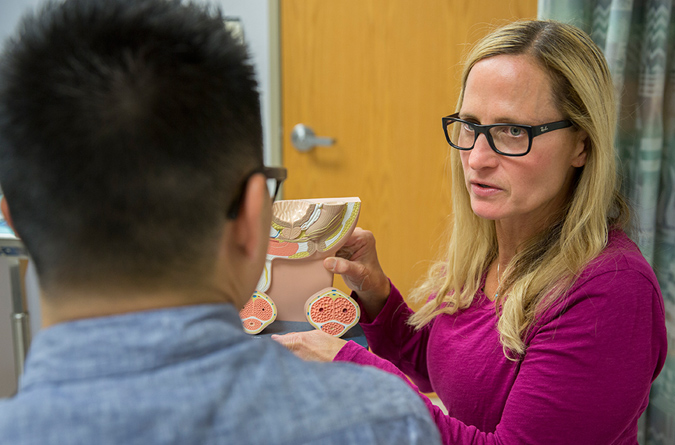Urology
Our experienced team offers confidential, personalized care for the full range of urinary health conditions.
Medically reviewed by Marc Dall'Era, M.D. on Aug. 23, 2023.

Innovative Care and Research
UC Davis Health is a leading center for urology care and research. Physicians and families across Northern California come to us for our skill and experience, as well as access to the latest treatments. From urologic cancer to kidney stones, our urology specialists are here to help.
Our Difference
Exceptional Expertise
Our fellowship-trained urologists subspecialize in certain areas of urology. This high-level training provides a greater expertise in specific conditions and treatments.
Multispecialty Care
Our urologists work with specialists across UC Davis Health to provide comprehensive care. Frequent partners include nephrologists, pediatricians, gynecologists and medical oncologists.
Pioneering Research
Our urologic research program is one of the largest in the U.S. We are helping advance the understanding of urologic diseases and how to treat them more effectively.
What Is Urology?
Urology is the medical specialty that deals with problems of the male and female urinary tract and male reproductive system.
The urinary tract starts with the kidneys, which filter waste from your blood and produce urine. From the kidneys, urine passes out of your body through the ureters, bladder and urethra.
The male reproductive system produces sperm and the fluid that surrounds and protects them (semen). Parts of the male reproductive system include your testicles, prostate and the various tubes that carry semen out of your penis.
Types of Urological Conditions
Female Urologic Conditions
Female urologic conditions include urinary problems, such as incontinence, overactive bladder and urinary tract infections (UTIs). Our urologists also treat pelvic floor disorders and pelvic pain.
Infections and Inflammatory Conditions
Urologic infections are common and can cause pain and inflammation. Examples include cystitis (bladder infection), pyelonephritis (kidney infection) and prostatitis (prostate infection).
Kidney Stones
Kidney stones are mineral deposits that form in your kidneys. Small stones may pass through your urinary tract with no pain. Larger stones can get stuck and cause severe pain and bleeding.
Male Urologic Conditions
Many urologic conditions affect men. Some include incontinence, male infertility and sexual dysfunction, benign prostatic hyperplasia (BPH) and testicular torsion.
Pediatric Urologic Conditions
Urologic conditions that affect children are different from those affecting adults. They include congenital abnormalities, sexual development disorders, daytime and nighttime wetting, and kidney stones.
Urinary Incontinence
Incontinence covers a range of issues. You may leak urine or have trouble making it to the bathroom in time when you feel the urge to urinate. You may also struggle to empty your bladder fully. Incontinence affects people of all ages and genders.
Urologic Cancer
Cancer can occur nearly anywhere in the urinary tract or male reproductive system. Our urologists are part of UC Davis Comprehensive Cancer Center, a nationally recognized program offering state-of-the-art cancer care.
Urology Services We Offer
At UC Davis Health, you’ll find the latest surgical and nonsurgical treatments for urological conditions. If surgery is your best option, you are in skilled hands. Our surgeons have extensive training and experience. Whenever possible we offer minimally invasive options, which use smaller incisions that lead to faster healing.
Highlights of our services include:
Laparoscopic Surgery
In this minimally invasive procedure, our surgeons insert a camera and pencil-sized instruments through several small incisions in your abdomen. We use laparoscopic surgery to treat kidney cancer and other kidney conditions. We can also repair undescended testicles in children.
Microsurgery
Microsurgery uses a microscope and tiny instruments to perform finely detailed operations. You may receive microsurgery to close off enlarged veins in your testicle (varicocele). We also use microsurgery for sperm retrieval as part of fertility treatment.
Reconstructive Surgery
Our surgeons perform detailed surgical procedures to repair physical abnormalities or damaged tissues. We also use reconstructive techniques for vasectomy reversal and to place penile implants for erectile dysfunction treatment.
Robotic Surgery
Robotic surgery is the leading edge of care for prostate removal due to cancer or BPH. This highly precise surgery helps surgeons avoid damaging the nerves around your prostate that control urination and sexual function.
Botox Injections
Botox injections are an important treatment for an overactive bladder. In this condition, the muscles around your bladder contract uncontrollably, making you feel like you always have to urinate. We inject Botox into these muscles to help them relax.
Fertility Preservation
Cancer and cancer treatment can affect a man’s ability to produce sperm. Fertility preservation, which includes sperm retrieval and freezing, allows male adolescents and adults to save their sperm for the future.
Penile Rehabilitation
Erectile dysfunction is a common side effect of surgery and radiation therapy for prostate cancer. Penile rehabilitation involves a personalized mix of medications, injections and exercises to help speed recovery and improve erections.
Urodynamic Testing
If you have incontinence or other urinary conditions, urodynamic testing helps assess how well your bladder is working. It involves a group of tests to assess bladder pressure, your urine stream and the filling and emptying of your bladder.
Why Urologic Health Matters
Urologic conditions can affect your ability to control urination and, if you’re a man, your sexual health. For many people, urologic conditions are personal and difficult to discuss. Having an experienced team you can trust is essential.
- Some urologic conditions are very common.
- Prostate cancer is the second leading cancer in men, after skin cancer.
- More than 60% of women experience urinary incontinence.
- Effective treatment can improve your quality of life.

"Key Statistics for Prostate Cancer", American Cancer Society, https://www.cancer.org/cancer/types/prostate-cancer/about/key-statistics.html
"Updated Prevalence of Urinary Incontinence in Women: 2015-2018 National Population-Based Survey Data," National Library of Medicine https://pubmed.ncbi.nlm.nih.gov/35030139/
Request an Appointment
As Sacramento's No. 1 hospital, you'll benefit from unique advantages in primary care and specialty care. This includes prevention, diagnosis and treatment options from experts in 150 specialties.
Referring Physicians
To refer a patient, submit an electronic referral form or call.
800-4-UCDAVIS
Patients
Call to make an appointment.

